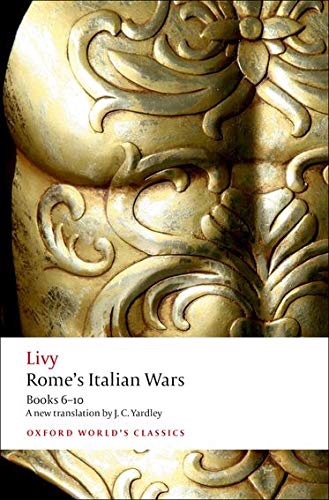Partial Annals of the rise of Rome.


In this Oxford World Classics edition of books 6-10 of Livy’s chronicle of the rise of Rome we learn much about an interesting time: fighting constant wars with her neighbours, whilst also undergoing continual class struggle at home (between the plebs and the patricians), Rome’s military might somehow transcends the vagaries of the Republican system – dictators in this era were appointed, and would resign once their work (the particular task for which they were appointed) was done: a very different conception from the modern dictator! – allowing Rome to dominate and gradually unify Italy under her rule.
The annalistic style makes, at times, for repetitive and rather dry reading, with regular lists of who was consul, dictator, or ‘master of horse’. Although there’s a strong temptation to skip all this naming, the formula has, for me at any rate, the unexpected humour value of throwing up some rather entertaining names: there are a number of amusing individual names, such as Furius, Manlius, & Postumius, and occasionally even a prize pairing, as in Spurius Furius! No doubt an awareness of such nominal nonsense inspired Python’s infamous ‘Biggus Dickus’ scene in life of Brian. The constant conflicts can perhaps likewise lose their edge through sheer exhaustion, something Livy tacitly concedes himself in places.
Even though the practice of history has evolved a lot, one sees with writers like Livy (and Arrian, Tacitus, etc.) the desire to relate history as faithfully as they are able. So Livy often gives several variant accounts, expressing his reasons for favouring one particular version over another. Two things, however, that date this relative to someone more modern, even someone as far back as Gibbon, for example, are that firstly, Livy already looks back to former times as being better than the present: the old ‘golden age fallacy’ again! One doesn’t even have to read between Livy’s own lines to see that, in our view (well, mine, at any rate) this was hardly a idyllic period: quite apart from the constant wars, they were a very superstitious and fickle lot!
Superstition is the second dating factor: for superstition, there’s such things as the auguries, the ‘hammering in of a nail’ ceremony, and at one point what sounds suspiciously like a witch hunt. For early Roman fickleness, try the fate of Marcus Manlius Capitolinus: once hailed as Rome’s protector, his championing of the plebs finds him recast as seditious, leading to a grisly end. Livy even notes at one point, showing that there was an awareness of such things even at the time, that religion was kept within the patrician class as a means of controlling the ignorant masses: ‘mainly so they could use superstition to keep the mind of the common people in check’ (p. 4). Some things don’t change!
All in all, very interesting in giving a picture, in part contemporaneous with Alexander the Great (about whom he makes a digression to consider how Rome would have fared against him) of the rise of republican Rome. But it does suffer from a certain dryness and repetition, mostly due to the annalistic form adopted.
